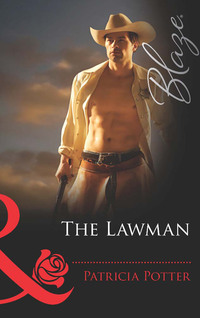
Полная версия
The Seal's Return
He nodded. “Sometimes we doctors are so busy taking care of our patients, we don’t have time to take care of our own families. I’m guilty, as well.”
He then asked medical questions, queried about diseases, treatments and protocols. “We have an older population with the ailments that come with it, but we also have our share of pregnancies, broken bones, flu and rattlesnake bites. We usually have a couple of those each year. We keep anti-venom in the office but then the patient has to be transported to a major hospital that maintains a larger stock.”
“As to staff,” he said, “I have a very competent nurse, but she isn’t qualified to write prescriptions. There’s also a part-time bookkeeper who works out of her own house. She can take care of most of the paperwork for Medicare and insurance companies.” He studied her for a moment. “I can’t pay you much, but the town is providing a home, and the experience will be useful.”
She nodded.
“Let me know what you decide after you visit Covenant Falls and see the clinic. The position is yours if you want it. If Cliff Rainey recommends you, that’s good enough for me.”
She breathed easier as she left. She glanced at her watch. It was one-thirty in the afternoon. She had left Chicago on an early flight that morning, but then there was the long drive from Denver. She understood it would be another hour and a half drive to Covenant Falls, then the drive back to Denver for another early-bird flight to Chicago.
Her aunt was staying with Kerry and Gordon. She hadn’t told them about the possibility of moving. She didn’t want to say anything until she felt reasonably confident the position was a real possibility.
“What do you think?” Eve asked when Lisa joined her in the hospital reception area.
“He said the job is mine if I want it,” she said.
“So now it’s my job to convince you to want it,” Eve said. She explained that the town was cradled on one side by mountains and the other by the plains. “There’s approximately three thousand people in the area, including ranches that aren’t in the city limits but contract for city services.”
“I’m going to be taking my sister and brother out of the schools and activities they know,” Lisa said. “What is there for them here?”
“The school is highly rated and will open in four weeks. We have football, baseball, basketball and track along with a terrific music and drama department. Then there’s skiing clubs, Boy Scouts and Explorer Scouts, community baseball and football. There’s also a lot of special-interest groups—music, mechanics, computers, a horseback riding club.”
“It sounds great. To me. I’m not sure it will to them. They love the city.”
“Maybe because they’ve never experienced anything else,” Eve said.
Lisa was silent the rest of the drive into town. Rolling plains reached toward the mountains. The two-lane road was bordered by fences with occasional breaks leading to houses and barns. As they entered the town of Covenant Falls, it looked even smaller than she’d imagined. She counted all of three stop signs. Eve parked in front of an attractive building she identified as city hall, and they walked across the road to the Covenant Falls Medical Clinic.
She met the nurse, Janie Blalock, who didn’t look much younger than Dr. Bradley. The nurse was friendly and showed her around the office, including a small X-ray room. It was, Lisa thought, probably well equipped for a small-town doctor but she would miss all the state of the art diagnostic technology available in Chicago.
“Time for lunch,” Eve announced when Lisa finished the tour.
Lisa thanked Janie, then she and Eve walked half a block to a glass-fronted building with a big sign proclaiming it to be Maude’s. The diner was nearly empty, and they took a seat next to the window. A large motherly looking woman immediately came over.
“This is Maude,” Eve said. “She owns this place and it has great food.”
“This the new doctor?” Maude asked.
Lisa looked helplessly at Eve.
“She’s looking us over,” Eve said lightly.
“You’re a sight prettier than Doc Bradley,” Maude said. “Your meal is on the house,” she added. She studied Lisa solemnly. “Seems to me you need a bit of meat on you. How about a steak?”
“They’re good here,” Eve said. “My husband swears by them.”
Lisa wasn’t sure. The last few days of uncertainty and worry had her stomach in turmoil. But she also had to eat and she still had a long day ahead. She nodded. “A steak and salad with dressing on the side, please. And an iced tea.”
“I’ll take the same,” Eve said.
When Maude left, Eve turned to her. “What do you think?”
“I like Dr. Bradley. I like the clinic. I like the mountains. But I’m not sure Kerry and Gordon will feel the same.”
“My son lost his father when he was four,” Eve said. “I know how difficult it is for a child to lose a parent. And you and your siblings have lost both. But this town supports its own, and that would include you. We’ll do our best to keep your family safe and happy.”
They couldn’t do any worse. Their Chicago neighborhood that had once been a safe place to live now bred gangs. It wasn’t home sweet home anymore. She just wasn’t sure Gordon saw it that way.
“I’ll show you the house after lunch,” Eve said. “The owner passed away and the heir agreed to let us use it and much of the furniture for a year if we did the repairs and voided the overdue taxes. It’s a good deal for us both. My husband and his group of vets painted the house and fixed everything that needed fixing.”
“Group of vets?”
“We have a lot of veterans here,” Eve explained. “In fact, a military nurse recently moved here. She was wounded in Afghanistan and wasn’t ready to go back to nursing, but she’s available in an emergency.”
Lisa absorbed that. Since their mother died, Gordon had threatened to go into the military when he was old enough, and she had done her best to dissuade him from that path. Would a town full of vets sharpen his interest? One count against coming here.
The food came then, Lisa’s stomach’s turmoil ending at the smell of the steak. Once bite proved Eve’s recommendation. It was excellent and the salad good. The prices were amazingly low, even if the meal hadn’t been free. One count for moving here.
Eve continued to plug the town as they ate, then drove her around for a tour. They drove by a wooded park with a gazebo in front of a sprawling building. “That’s our community center and library,” Eve said. “And there’s a small museum and a beach, as well.”
“Where do the kids usually gather?”
“School. Maude’s. The falls. The community center or sports field. Or they go horseback riding as incentives. Nearly every kid in town can ride. I have two horses that your brother and sister can ride.”
A plus for Kerry, the animal lover. Lisa wasn’t so sure about Gordon. His sport of choice was soccer and he’d quit playing in the spring.
Eve took a corner just three blocks from the clinic and stopped in front of a white house. It was a two-story with a connected garage. A white picket fence stretched around the property.
She and Eve walked onto the small porch. Eve unlocked the door and they went inside. The house was not unlike her parents’ house in Chicago: a large living room with a fireplace, a kitchen with plenty of cabinets and a small dining room. There was a master bedroom and bath downstairs and two nice-size bedrooms and a bathroom upstairs. It looked newly painted and the furniture, though a little more formal than she liked, looked comfortable.
She looked out the kitchen window and saw a large fenced area. “Pets are welcome, too,” Eve said.
Lisa hadn’t thought of that. Kerry had always wanted a dog, but it never happened for one reason or another. Maybe...
She realized she was making a life-changing decision for all of them. A huge decision. Kerry may be happy with it, especially with a dog and horseback riding. Gordon, the other hand, would hate it. She would be taking him away from his so-called friends and all he knew.
She thought of the argument they had when she caught him trying to sneak out of the house after his release from jail.
“You can’t tell me what to do,” he’d said, his face red with anger. “You’re not my mother. You’re not even my real sister.”
It was a barb that hurt more than she let him know. She had been adopted when her mother failed to conceive after years of trying. Eleven years later, her mother delivered Gordon, and Kerry arrived four years after that.
Lisa had mothered them, especially after their father was killed, and her mother went to work in a real estate firm. She loved her siblings with her whole heart.
And now...she would be turning their lives upside down. Again. She hadn’t told them she was flying to Colorado. They would just assume she was at the hospital. “What do you think?” Eve said, breaking into her train of thought.
Lisa hesitated. “It’s very nice.”
“I sense a reservation,” Eve said.
“I think you should know why I’m considering this,” Lisa said slowly. “You might change your mind about wanting us.” She’d told Eve on the telephone there were problems, just not how severe they were.
Eve didn’t say anything, just waited.
Lisa spelled out the story, from her mother’s death to Gordon sneaking out after his arrest. “I hoped the arrest would scare him, but it didn’t.” She hadn’t meant to say that. It was another failure on her part and she wasn’t used to failing. She should’ve noticed Gordon’s problems, just as she should’ve caught her mother’s illness before it was too late.
“Losing two parents is a lot for a kid to handle,” Eve said slowly. “I can’t imagine my son dealing with losing me after already losing his father.”
“I should have been there for him,” Lisa said. “I have to do it now and hope it’s not too late.” She paused, then added, “I talked to the caseworker handling his case. She said she would ask for probation and suggested it might be possible to transfer supervision here. Can you do that?’’
“We can. We have a new police chief who’s great with kids.”
“It’s okay, then?”
“I’m sure it will be,” Eve replied. “Sometimes magic happens in Covenant Falls.”
“It would have to be pretty major magic.”
“That happens, too. Someday I’ll have to tell you how I met my husband.” Eve paused then asked, “So what do you say? Does the house and clinic work for you?”
Decision time. “Yes,” Lisa said, her stomach tightening. She was gambling and she didn’t like to gamble. She didn’t see any other choice. “I’m happy to accept the offer.”
CHAPTER TWO
JUBAL PIERCE PLUCKED the letter he’d received yesterday from the trash can. He’d read it then and discarded it. This time he reread it slowly and considered the proposal.
His first inclination had been Hell, no.
That was his answer to almost everything these days.
He took a swallow of Jameson Irish whiskey as he glanced around the San Diego apartment he shared with two other SEALs. He was the only one in residence now. The others were on missions. He usually saved the Jameson for the end of successful missions. Now it signaled the end, period.
He couldn’t stay here now. His career as a navy SEAL was over. He knew it. His superiors knew it. His body had been too damaged by two years of near-starvation and captivity—not to mention what it had done to his mental health.
He’d been a SEAL half his life. It had been his entire identity until that rescue mission had gone to hell, and he was taken.
He’d crawled out of a jungle with the last of his strength. After his captors abandoned him, he’d found a key to the chain around his wrists in the bread that his guard had thrown at him. One act of mercy, maybe because he’d saved the man’s life a year earlier. The tribesman probably didn’t think he would make it through the jungle alive. He barely did. He didn’t want to think of those days spent crawling through the jungle more dead than alive.
He’d been offered a slot as a SEAL instructor but turned it down. Too many memories. Too many friends dead. Too many sleepless nights because of nightmares. He looked at those young, fatigued warriors who were trying to survive the almost unsurvivable SEAL training and he saw the faces of his dead teammates. He didn’t have the heart to drive the candidates to be what you had to be to win the coveted trident, the SEAL symbol.
Problem was he didn’t have the heart for anything. He looked down at the glass of whiskey. The Jameson was a reminder of other days when he and his team members had splurged after a successful mission. A last salute to a life he was leaving. If there had been ice, it would have made a merry noise from the shaking of his hand.
He looked back at the letter from Clint Morgan, a helicopter pilot who had once rescued his team from one hell of a bad situation. They had gotten very drunk together that night with Jameson, and although they rarely saw each other after that, they’d stayed in touch. When they did manage to meet, it was usually a boisterous celebration with a lot of drinking. Their last meeting was three months before his last mission...
He picked up Clint’s letter again.
Hey, cannot tell you how happy I am to hear you’re still among the living. I’d heard you were missing, presumed dead, then a few weeks ago heard you’d turned up. I toasted you in absentia with our favorite whiskey. I should have known no mere terrorist could keep you down. David Turner told me you were leaving the navy but he wasn’t sure what you planned to do.
Don’t know if you heard, probably not, but I left the army because of a head injury. I was in limbo until I ended up in a small Colorado town called Covenant Falls, and believe it or not, I’m now its police chief. I’m also a married man as of a month ago. I can hear you laughing now.
In case you’re at loose ends as I was, there’s a cabin available here that is handed down from vet to vet who’s leaving the service and trying to figure out what’s next. It’s on a lake and backs up to the mountains. Fishing and hiking are great. The town is full of veterans and there’s a weekly poker game along with a fine watering hole that caters to us. What more could you want? The cabin, by the way, would be all yours. I lived there for several months and can vouch for its comfort.
The town itself is small, rather quirky, but it has good people. The last three vets who used the cabin decided to stay here, including the former Ranger I mentioned, a battlefield military nurse and yours truly. Anyway, come for a few days at least so we can tell lies, toast friends and drink a bottle of Jameson.
Jubal put the letter down. He’d changed a lot since the last time he’d seen Clint. He hadn’t gained back all his weight and he often woke in a cold sweat. After all the isolation, he was uncomfortable in crowds and had difficulty carrying a conversation. He was mentally adrift.
And then there were the nightmares. He relived the ambush over and over again. He wondered why he lived and those who’d been with him didn’t. One of the things he needed to do was visit the families of his teammates who’d died in Nigeria. He hadn’t been mentally able to do that yet. Maybe visiting Clint could be the beginning of that journey.
No one had loved flying more than Clint, and he’d planned, like Jubal, to be a lifer in the service. If he could make a successful transition, maybe Jubal could, as well. He heard Clint’s humor in his letter. There would be no pity. No sympathy. No expectations. No questions.
No reliving hell.
He picked up his cell and punched in the number Clint had provided...
* * *
EIGHTEEN DAYS LATER, Jubal stuffed some clothes in his duffel along with several books. He drove straight through from San Diego to Covenant Falls, Colorado, stopping only long enough for coffee, hamburgers and gas. He had no trouble staying awake. Sleep never came without nightmares, so he tended to avoid it, anyway.
A little more than a thousand miles and twenty hours later, he reached his destination midmorning.
He followed Clint’s instructions through a small town to a road that ran beside a lake. Clint hadn’t been kidding when he said the town was small. He couldn’t imagine Clint, who was always the life of the party, being happy here. Even less could he imagine his friend as its police chief. That must have been one of Clint’s jokes. He’d been a full-blown hell-raiser back in the day, made even Jubal look like a saint.
It was just after ten in the morning when he found the place, the last one on Lake Road. He drove down a gravel lane to a cedar-sided cabin with a large screen porch stretching across the entire front of the structure. He stepped out of his car, a dark blue Mazda, and took a deep breath. The air was scented by the giant pines that surrounded the cabin. The clear blue lake was visible through the trees.
Clint had told him the cabin would be unlocked, the keys inside on the kitchen counter. Jubal grabbed his duffel from the backseat of the car and took the three steps up to the porch. He opened the screen door, then the door to the interior of the cabin, and looked inside.
As Clint promised, it was cozy. A stone fireplace filled one side of the main room and a wall of windows another. He looked outside. There was a rock grill surrounded by several comfortable-looking lounge chairs. Then the yard ended in what appeared to be forest stretching upward.
He checked out each room, then retreated to the kitchen where there was a thermos of coffee and a plate of cinnamon rolls waiting for him, along with a note.
Tradition dictates the cabin comes with fridge full of food. I added some beer and, knowing you, some damn good whiskey. Help yourself. Call me when you’re settled.
Jubal didn’t call. Instead, he took the thermos of coffee and rolls and headed toward the front porch. He sipped the coffee, which was still hot, and ate two rolls, then decided to explore further. He walked out to the road, glanced at a dock, which looked new. To his right, he noticed a path winding up a mountain. He took the path and climbed up to a spot where he had a good visual of the land around him.
Habits die hard. It was still part of him, this reconnaissance of his immediate environment, a suspicion of strangers, a springboard reaction to the slightest noise.
He was tired. It had been an exhausting drive from San Diego, and he hadn’t slept in more than forty-eight hours. There had been a time when he would still be going strong, but he hadn’t regained the stamina he once had. It had been one reason he’d rejected the job of trainer. He couldn’t imagine driving candidates to do something he could no longer do himself.
He was working on that stamina. His weight had gone from two hundred and ten pounds on a six-foot-three frame to little more than half that during his long months of captivity. It was up to a hundred and seventy-five now, all of it hard muscle after a strict exercise regime, but there had been enough permanent nerve and joint damage to end his career as an operating SEAL.
After returning to the cabin, he relaxed in one of the lounge chairs outside and watched as the sun reached its zenith and started back down again. He appreciated the fact trees shielded the cabin from the dwelling next to his. He was used to isolation.
At least this isolation was of his choosing.
His mind flipped back to Africa as it did too often. He’d been left alone for long periods of time, unless one of his guards came into whatever cave or hut they kept him in. And then it was only to beat, taunt, threaten or sometimes do all three. A gun was held against his head or a knife across his throat. He had scars all over his body from repeated torture.
The only thing that kept his captors from killing him was their belief he was a doctor and could be of use to them. He advised them on what medical supplies to take from the clinic before they burned it, to reinforce his lie.
Jubal took a deep breath. He was in the States again, the master of his own fate once more. Problem was, he had no idea what he wanted that fate to be. That was a first for him and he didn’t like it.
He knew he should call Clint, but he kept putting it off. He didn’t want to answer questions. He didn’t want to deal with small talk. He certainly didn’t want to talk about the last two years.
As a SEAL, he never thought about the next week or the next month, just the next mission. It was better that way. Think about the future and you start making mistakes.
Now he had to consider it.
He heard a car pull into the drive. He looked at his watch. It was nearly six. Clint, most likely. He’d probably been waiting all day for his call.
Still, he didn’t move as Clint appeared from around the cabin. A scarred pit bull was at his heels.
“Hey, Reb.” Clint used the nickname Jubal’s fellow SEALs had given him when he joined his first team. His grin was wide as ever.
Jubal looked at him. Clint wore a tan uniform and carried a sidearm, but he looked relaxed. The exhausted lines Jubal remembered around his eyes were gone. He turned his gaze to Clint’s scarred companion.
“Who’s your friend?” Jubal asked without moving.
“Bart. He rides along with me.” Clint leaned down and whispered something into the dog’s ear. The dog came over to Jubal and looked at him solemnly with deep brown eyes.
“I told him you’re a friend. He’s saying hello.”
The dog was among the ugliest Jubal had seen. Like himself, the dog had scars all over his body, but the animal waited patiently for a response.
Jubal immediately felt a kinship with the dog’s obvious brutal past. He leaned over and rubbed behind his ears. “Hello, Bart.”
“He adopted me last year,” Clint explained. “I had no choice in the matter, but I thought he would be a good icebreaker today,” Clint said. “I wasn’t sure I’d be welcome since you didn’t call.”
Jubal relaxed slightly. He sounded like the old Clint. “I just needed a few hours’ rest. I drove all night,” Jubal said without elaborating. Then he looked Clint up and down. “You weren’t kidding about being a cop?”
“Nope. Some of those MPs we encountered would have strokes if they knew. Okay if I get a beer?”
Jubal didn’t bother to get up. “Since you supplied them, I’d be a real jerk to say no.”
“Now that’s the wholehearted ‘Hello, great to see you’ that I expected,” Clint groused good-naturedly. “But I accept the invitation.” He headed for the cabin, disappeared inside and reappeared with a beer. He slouched down in the lounge chair next to Jubal. “Like that scruff on your face,” he said. “It’s a hell of a lot more civilized than the last time I saw you in Afghanistan.”
“I didn’t want to scare the natives,” Jubal replied.
“I don’t remember you being that sensitive.”
“It’s only on your account,” Jubal said. “I’m your guest. I wasn’t sure you weren’t kidding when you said you were police chief. Didn’t think it would look so hot if I turned up looking like a biker.”
Clint shrugged. “They’re kind of used to us now. Nothing bothers them much.”
“Us?”
“Vets occupying the cabin. We’ve kinda been adopted by the town folks.”
“What if you don’t want to be adopted?”
“That’s okay with them, too. The people in town don’t ask questions or impose, except maybe to quietly drop off a pan of brownies or cinnamon rolls. That’s rule number one in town.”
“Dropping off brownies or not asking questions?”
“Okay, rule one and two,” Clint corrected himself.
Jubal looked at him curiously. “How did you come here? Doesn’t look like your kind of place. Seem to remember you liked big cities with lots of bars.”
“The shrink at the military hospital where I was treated recommended it,” Clint said. “Dr. Payne. He was Josh Manning’s doctor at Fort Hood, and they became friends.”
Clint hesitated before continuing. “This is Josh’s cabin. He inherited it—along with a traumatized military dog—from his best buddy who died saving his life. He admits to being in pretty bad shape when he arrived with a lot of survivor’s guilt and a bad case of PTSD. All he wanted was to be left alone and wallow in grief and guilt.”









